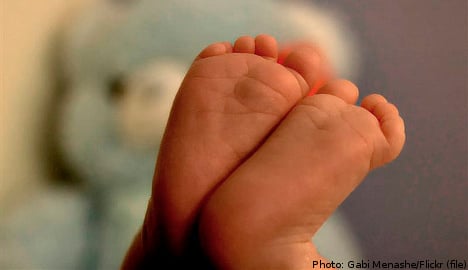For many, the inevitable conclusion of a Swedish love story is winding up in a maternity ward in Sweden directing birth.
Chances are if you have a Swedish partner who gets pregnant, she will want to return to the loving bosom of her native land for the delivery.
Socialist medical utopia for the mother and a crash course in the svenska Hippocratic terminology for us English speaking fathers.
Now it has often been said that the best way to learn a new language is to date a native speaker.
In fact, I would go further and suggest ditching your expensive courses and having a baby instead.
Seriously, you will adopt a new lexicon of bizarre words such as foglossning, fostervatten and moderkaka and all for entry into the Pampersklubben.
Moderkaka?
At first I thought it was a variation of the Swedish delight kladdkaka.
Sadly not, as the literal translation is “mother cake”, better known as the placenta.
It doesn’t really work with cream unless you are Tom Cruise, who once quipped he would eat his wife’s placenta (whether he ever did remains unknown).
Last May, I discovered my sambo (co-habiting girlfriend) was pregnant and we decided to move to Malmö in early 2012 as the birth drew near.
The medical staff in Britain wholly endorsed our idea, believing that the Swedish health service to be the best in the world.
(Assuming you can dodge the bullets on the way to hospital in the gun crime capital of Scandinavia of course.)
Routine appointments with the midwife followed and she even indulged me by speaking English.
As my sambo and I aren’t married (hence why we are not allowed in my native Ireland) I had to sign some papers to confirm I was indeed the baby daddy before being encouraged to go on the Jeremy Kyle show (the UK’s equivalent to Jerry Springer).
We were promised an interpreter at the local family legal services centre (Familjerättsbyrån), where they seemed genuinely amazed that we Irish speak English.
A gent speaking the Queen’s finest was duly supplied and then prompted me to confirm the suggested dates of conception. A minor silence ensued with some quizzical looks which was a tad embarrassing.
It was almost implied that if you haven’t tied the knot then you sleep around.
Liberal Swedes, eh?
Papers signed and they haven’t yet come looking for a kidney, so all seems to be in order.
Like many modern dads, I took on the role of birth partner by reading all the right books and memorizing the route to the hospital.
Conclusion to all this research: shut up and do as you are told.
My partner was a week late, breaking the Swedish norm of punctuality.
Once the water broke, we were sent home several times before active labour begun.
Upon arriving at the hospital we were confronted by a large board listing all the wards using long and intimidating Swedish words.
It sparked a look of confusion like finding out that classic British sitcom Fawlty Towers is called ‘Pang i bygget’ in my adopted land. ‘Bang in the construction work’ indeed – none of it made any sense.
Pushing a red button did though and we were ushered to a private room.
Our bilingual birth plan was supplied to the midwives as we passed the few hours laughing and eating pancakes before all hell broke loose.
Any first time parent will tell you that nothing prepares you for childbirth.
Particularly when you are relying on your partner to translate key words during intense contractions.
As labour progressed, our soon to be born son’s head was passing through the cervix according to the midwife.
Trying to find the English word for polotröja to describe how his head was lodged in the cervix, she hesitated and looked at me for a solution.
The midwife needn’t have bothered as my partner roared ‘turtleneck’ and proceeded to keep on panting.
By now my role was to provide drinks via a straw and towel down my partner like a boxing trainer between rounds. During the final phase of pushing the midwives gave me a new role – gasman.
This involved holding the gas mask down on my partner’s face and keeping it handy for when called upon.
At least that was the plan anyway.
With the baby’s head on the way out a midwife beckoned ‘have a guess’ and I replied ‘a boy’ thinking she was asking about the gender of my newborn baby.
Cue confused looks before I realized that she was demanding I pass the gas to my partner.
We managed a slight chuckle at the lost in translation moment but my sambo was less amused.
Within moments our son was born and all the confusion of the past few hours had faded away.
There was still time for one final cock up as I remarked on the birth certificate description of ‘gosse’ thinking his birth weight was that of a small goose.
On the plus side we are now referring to our new arrival as a little goose and suggesting that he listens to his mother instead.
Fatherly duties have continued by being dispatched to nearby Lund to buy special nipple cream and attempting to throw in some of my new vocabulary into casual conversation.
Now, anybody for some moderkaka?




 Please whitelist us to continue reading.
Please whitelist us to continue reading.
Member comments